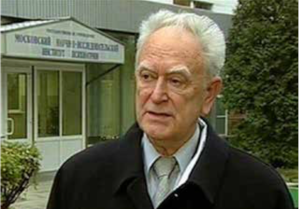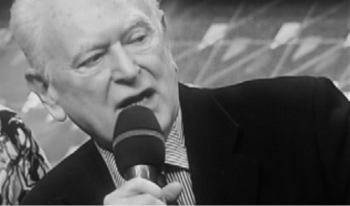Interview with Professor Yuri Polischuk: “Psychiatry is in danger of dehumanization”
On behalf of the Department of Neural Mechanisms and Brain Science of the Science and Enlightenment Academia (BAA), we had an interview with Professor Yuri Polischuk, who worked as a psychiatrist in the Soviet Union and later on in the Russian Federation. Professor Polischuk spoke about the well-organized psychiatric services in the Soviet Union and explained various approaches of the time on mental disorders, in comparison with today's psychiatry. We thank him on behalf of the Academy of Science and Enlightenment (BAA).
Interview: Ekin SönmezTranslation: Yasin Çalış

Dear Prof. Polischuk, thank you for accepting our interview request. First of all, I would like to ask you to introduce yourself and your institution for our readers?
Yuri Iosifovich Polischuk, born in 1934, , Doctor of Medical Sciences, Professor.
I am the Chief Researcher of the Moscow Research Institute of Psychiatry - branch of "V.P.Serbsky Scientific Research Center for Psychiatry and Narcology" of the Russian Ministry of Health.
Did you work as a psychiatrist in the Soviet Union? What was your position at that time?
At first I worked as a psychiatrist at a psychiatric hospital in Chernigov (Ukraine). Then I started as a junior researcher at the Institute of Psychiatry of the Academy of Medical Sciences in Moscow, worked there until 1968. Since then I have been working as a senior researcher, as the head of the Department of Old Age Mental Pathology at the Moscow Research Institute of Psychiatry. For 15 years, I had been the chief scientific secretary of the Society of Psychiatrists.
Thank you for this introduction. Now let me ask you some questions about psychiatric practice during the Soviet Union and that of today. We can start with the general aspects. Could you brief us about how psychiatric care was organized in the Soviet Union?
In the Soviet Union, there was a coherent step-by-step organization of psychiatric care, which consisted of a relevant subdivision in the Ministry of Health, the Chief Psychiatrist's Office and a network of regional, provincial, municipal psychiatric hospitals and dispensaries. There was a link between hospitals and dispensaries. There were psychosomatic and somato-psychiatric hospitals, psychiatric units in polyclinics, sanatoriums for psychoneurological disorders, psychoneurological nursing homes for chronic patients and the disabled.
Was there a professional and/or legal framework for the provision of mental health prevention and protection services?
The professional and legal framework for the provision of services for the prevention and protection of mental disorders and the mental well-being of the population was defined by the Act on Psychiatric Care and Guarantees of Citizens' Rights in the Provision of Psychiatric Care, the Code of Professional Ethics for Psychiatrists, and the ethical committees of psychiatric institutions.
Thank you. Now we can move on to some specific questions. Let me start with the addiction disorders. It is well-known that the fight against different types of addictions was an important issue in the USSR. Could you elaborate on that? What kind of treatment and services were provided in this regard?
The narcological services in the USSR were extensive, which included narcological psychiatrists and specialists in narcology. There was a narcology department in the Ministry of Health headed by the chief narcologist. The Institute of Narcology as well as narcological hospitals and dispensaries were established. So-called "sober-ups" were functioning to assist patients who were in deep intoxication and withdrawal. Treatment and employment facilities were established for the involuntary treatment of alcohol and drug addicts. A range of treatment methods were used: Hypno-suggestive therapy, conditional reflex therapy, emotional stress therapy, "coding" method, combined psychopharmacotherapy aimed at suppressing pathological attraction to addictive drugs, aversive therapy aimed at sensitizing alcoholic patients, as well as detoxification methods.
Could you tell us about psychotherapy facilities as well? Was there a leading school of psychotherapy in the Soviet Union, or was there a variety of schools available?
The leading school of psychotherapy was personal-oriented (reconstructive) psychotherapy, based on the theory of relationships between the individual and the social environment. Conditional reflex therapy, based on the teachings of I. P. Pavlov was widely used. Variants of suggestive psychotherapy, cognitive behavioral psychotherapy and various types of art therapy were also used.
We know that the approach of the Soviet Union towards medicine was public-health oriented and socialized. Could you tell us about the rehabilitation services for chronic mental disorders? For instance, was it possible for someone to work had he/she a mental disorder?
Theoretical and practical aspects of social and labor rehabilitation of mentally ill people were actively developed by T.A.Geyer and D.E.Melekhov in the USSR. The indications and contraindications for different types of labor and activities in case of schizophrenia and other mental disorders were developed. The social and labor prognosis of mental disorders were studied, the methodology of social and labor expertise was developed by an institute specially created for this task.
Stigma is another important aspect of psychiatric disorders. Can we speak about a special effort related to overcoming the stigmatization of mentally ill people in the Soviet Union? How did society interact with psychiatric patients?
In the Soviet Union, sufficient attention was paid to issues related to the stigmatization of the mentally ill, as well as to measures to overcome stigmatization. Specific measures in this direction were formulated and defined in a special law on “Psychiatric Care and Guarantees of Citizens' Rights in its provision", as well as in the "Code of Professional Ethics for Psychiatrists". Ethical committees have been established at psychiatric institutions. When necessary, state institutions and human rights organizations also intervened to protect the constitutional rights of mentally ill persons.
How did Soviet psychiatrists view the psychiatry in the West?
Soviet psychiatrists were interested in the achievements of Western psychiatry and sought to expand contacts with foreign psychiatrists. However, due to ideological reasons, a critical attitude towards some theoretical positions and foundations of Western psychiatry (Freud's psychoanalysis, Binswanger and Jasper's existential analysis, neothomism, pragmatism, personalism) was maintained.
There are widespread allegations of political abuse of psychiatry during the Soviet Union. These allegations mostly come from Western sources among others. What is your opinion on this issue? You worked in the Soviet Union, what is your personal opinion about these allegations?
Personally I have not encountered any case of political abuse of psychiatry, except for some restrictions of the mentally ill during mass festive processions. If there had been any political abuses of psychiatry, they were isolated and controversial cases, which were later greatly exaggerated by the media.
We have a few last questions about today's psychiatry. You have witnessed both periods and two different systems. What do you think were the main differences between these two systems in terms of psychiatry?
Russian psychiatry today, in the era of globalization, has borrowed a lot from Western psychiatry: It has moved to the international classification of mental disorders, introduced a large arsenal of psychopharmacological medications into medical practice, mastered many Western psychotherapeutic and psychometric methods. However, at the same time, it seems to me that the traditions of tracing subtle clinical and psychopathological details and clinical and anamnestic research of mentally disordered people are being lost, the coherent, holistic approach to the mentally ill is being lost.
How do you, as a psychiatrist, interpret the changes that have taken place over the years?
I think, while striving for the complete objectification of mental disorders with the help of modern methods and techniques, the vision and understanding of the personality of the suffering patient is lost. There is underestimation and neglect of the subject to subject relationship between the doctor and the patient, ignoring the underlying mental patterns, which can largely determine the nature of the course of the disease and its outcomes. Finally, psychiatrists do not pay much attention to patients’ inner psychic realm, which is the core and basis of his/her personality. Here lies the danger of further dehumanization of psychiatry.
